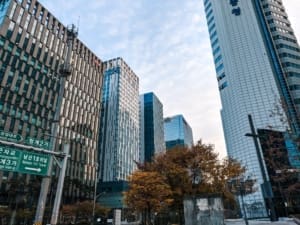Relocating to South Korea: an expat’s guide

South Korea’s ambitious plans to generate 70% of its power from carbon-free sources by 2038 will turn it into one of APAC’s renewables leaders.
Seoul has taken longer than some of its regional neighbours to set out its decarbonisation pathway, but is now taking strides towards expanding renewables capacity – particularly in solar and onshore wind.
The government is placing large emphasis on local talent, but deploying turbines and infrastructure at this scale requires the mobilisation of specialists from regions with more mature renewables markets, like the UK and Europe, bringing their deep technical and sector expertise to kickstart this emerging sector.
Each jurisdiction is always different, but South Korea has some unique factors in both the way the market operates and the on-the-ground admin involved in relocating. Both of these make it essential to work with a specialist recruiter with in-country presence, knowledge of how the sector operates, and embedded global mobility and compliance expertise around visas, work permits, healthcare, housing, schools, and everything else involved in moving and setting up a life in Korea.
Renewables job opportunities in South Korea
Onshore renewables is where South Korea has made most of its progress toward net zero. The country has 542MW operational in solar, but with recent contract awards and more assets in the planning stage total capacity could grow to up to 4.6GW by 2030.
In onshore wind South Korea has 847MW installed, but the industry is growing, with other projects in development like Gunwi Wind Farm and Yeongdok 1 expected to take the industry to over 1.1GW this year.
Seoul also has huge ambition in offshore wind. Its plan to install 14.3GW by 2030 will effectively increase capacity 100-fold from 2023 levels. Reaching the goal means an intensive six years of investment, development and construction, all of which will create around 770,200 jobs.
According to 4C Offshore, South Korea has 154 offshore wind farm projects of which 6 currently operating, none where construction has progressed enough to connect the turbines and generate electricity, two are in the build phase, and seven are either consented or have applied for consent.
Some pioneering developers are also setting up green hydrogen projects, kick-starting the decarbonisation of heavy industrial regions like Ulsan.
Given the infancy of the South Korean renewables sector, most of the 40+ key roles we’ve supplied to date have been in development, pre-construction and engineering, including:
- Grid Connection Manager
- Finance Director
- FP&A Financial Controller
- Senior Project Manager
- Project Manager
- Head of Commercial & Strategy
- Senior Business Development Manager
- Consent Manager
- WTG Commercial Lead
- WTG Package Manager
- Senior Technical Manager
- Head of Government Affairs
- Stakeholder Manager
- Asset Director
- Development Director
- Senior Foundations Engineering Manager
- Procurement & Contracts Director
We’ll continue to deliver these kind of roles with experience in navigating permitting, EBL (Electricity Business Licensing), auctions, environmental impact assessments and government relation – all the necessary early stages to get a project off the ground.
As projects progress through auctions and into construction and installation phases, we expect a greater demand for overseas contract specialists too. We’ve already been involved in delivering client rep specialists, for example.
Besides offshore wind, there are also opportunities in more established onshore renewables sectors, including solar and storage and green hydrogen.
Moving to South Korea
Many HR departments aren’t equipped to onboard expats, but Taylor Hopkinson and Brunel can act as an Employer of Record (EoR) for clients without an established entity in South Korea. So working with someone on the ground in Korea, who has experience and deep knowledge around its local labour laws, is the best way to prepare for a move.
Alongside our colleagues at Brunel, Taylor Hopkinson has a team of ten based across Korea in Seoul, Busan and Geoje, focused exclusively on floating and fixed-bottom offshore wind and onshore renewables markets. Our local team handles all immigration and visa coordination, manages in-country insurance, and acts as focal point for contractor care and any change in regulation. All of which means we can help navigate the process of getting a visa, obtaining your residence card, finding accommodation and settling in.
It can take three to four weeks to process your residence card, which enables you to open a bank account, sign rental agreements, and get an official mobile number.
Whether you’re planning a full time move or as a contractor, all these factors make it essential to work with a recruiter with a local presence that truly understands the way things work in Korea.
Living in South Korea
Housing
Housing can be expensive in South Korea, especially in Seoul, and there are three different rental models which adds some complexity to renting.
Housing rents in South Korea operate under two primary models: Jeonse (전세) and Wolse (월세). Each model has distinct characteristics and financial implications.
Jeonse (전세)
Jeonse is a unique rental system in South Korea where tenants make a large, lump-sum deposit, typically 50% to 80% of the property’s market value, instead of paying monthly rent. This deposit is returned at the end of the lease, usually after two years, but this lease term can be negotiated between the tenant and landlord. Landlords typically invest the deposit, making income from interest rather than collecting monthly rent payments.
A family home in Seoul can cost a million USD, so the large deposit will often need to be financed through a bank loan.
Wolse (월세)
Wolse is a more conventional rental model similar to what is common in many other countries. Tenants pay a smaller deposit upfront, typically equivalent to a few months’ rent and monthly rent payments. Lease terms are generally one or two years, with the possibility of renewal or renegotiation.
Combined Model
Some landlords offer a combination of Jeonse and Wolse, where the tenant pays a moderate deposit and reduced monthly rent. The higher the deposit, the lower the monthly rent. For example, in central Seoul, you could pay $20,000 to $50,000 as a deposit, with a monthly rent of $2,000.
Where to live in South Korea
As with any country, the capital Seoul (population over 10 million) is the most expensive for housing but it’s also where the major company HQs are based.
The offshore projects tend to be based in Ulsan, Busan, and Incheon which are all major cities. Busan is a major port with a population of 3.5 million and is also know for its tourism, culture and international film festival. Ulsan has a population of 1.2 million and is a significant industrial and shipbuilding base. Both these cities have established expat communities, making them easy and attractive places to live.
Schools
For public schools in Korea, the primary language is naturally Korean, although some offer special programs for international students.
There are some excellent international schools, offering US or British curriculum, or International Baccalaureate (IB). The total cost for attending an international school can be significant, ranging from $20,000 to over $50,000 per year per child, depending on the school and the grade level. Some international schools offer scholarships or financial aid programs for eligible students. It’s worth inquiring directly with the schools about these options.
Language
While the majority of business is conducted in English, administrative processes like opening a bank account may mean writing your name and address in Korean. These are the small details you need to consider that underscore how important it is to work with a trusted partner like Taylor Hopkinson who can provide support throughout the process.
Healthcare
Residents in South Korea automatically enter the public health system and make a national health insurance contribution each month as a percentage of your salary, which can amount to hundreds of dollars per month. Those on a higher salary often opt out, in favour of private medical insurance.
Current opportunities in Korea
View all of our current opportunities in Korea or send us your CV if you’re interested in moving to Korea.
With a Taylor Hopkinson office in Seoul and our Brunel colleagues located in Busan and Geohe-si, we have boots on the ground in South Korea’s major project centres. Clients looking to reach a global network of specialists to power current or future projects can contact our in-country team to find out more about our track record and capabilities.
Making the move
As South Korea takes ambitious strides toward becoming a top player in the renewables sector, opportunities for both local and international talent are on the rise. Understanding the unique aspects of working and living in South Korea, from navigating project auctions to understanding visa processes and housing models, is crucial. With the help of a seasoned recruiter with in-country expertise like Taylor Hopkinson, navigating these complexities becomes easier. Whether you are considering a full-time move or a temporary contract, South Korea’s renewables sector offers a world of opportunities in an exciting, culturally rich setting.
